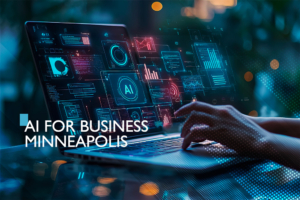AI for Business Minneapolis
Separating Facts from Fiction for Smart Implementation
Years in Business
Completed Projects
AI for business Minneapolis represents one of the most significant opportunities for growth in the Twin Cities market, yet many decision-makers remain hesitant due to widespread misconceptions and implementation concerns. Minnesota companies across manufacturing, healthcare, and professional services are discovering that artificial intelligence isn’t the complex, risky proposition many believe it to be. With proper guidance and realistic expectations, businesses can achieve measurable improvements in productivity and profitability. The key lies in understanding what AI can genuinely accomplish versus the myths that prevent smart adoption.

The reality is that Minneapolis business intelligence applications work best when they augment human capabilities rather than replace them entirely. McKinsey research shows that AI will add $13 trillion to the global economy over the next decade, but this growth comes from strategic implementation rather than wholesale automation. Minnesota companies that approach AI with clear objectives and realistic timelines report 25% faster task completion and 40% higher quality outcomes.
Professional service firms in Minneapolis particularly benefit from AI tools that handle routine documentation, client research, and scheduling optimization. Rather than eliminating jobs, these implementations free skilled workers to focus on higher-value activities that require human judgment and creativity. The misconception that AI requires complete operational restructuring prevents many businesses from exploring incremental improvements that could deliver immediate value.
Smart Minneapolis business leaders recognize that AI implementation risks are manageable when properly identified and addressed upfront. The most significant challenges include data quality issues, inadequate staff training, and unrealistic performance expectations. Research from MIT shows that 95% of companies attempting transformative AI projects encounter setbacks, while those taking incremental approaches achieve consistent positive outcomes.
Data governance represents the foundation of successful AI deployment, yet many Minnesota businesses underestimate the preparation required. Clean, organized data directly impacts AI accuracy and usefulness. Companies must audit their current data practices, establish quality standards, and create governance protocols before implementing AI solutions. This groundwork prevents the costly mistakes that derail ambitious projects.
Another critical risk involves choosing AI applications that don’t align with business priorities. AI automation Minneapolis succeeds when companies start with specific problems rather than general technology adoption. Rather than asking “How can we use AI?” successful businesses ask “What business challenges could AI help solve?” This problem-first approach leads to implementations with clear success metrics and measurable returns.
Security and compliance concerns also require careful attention, particularly for Minneapolis businesses in regulated industries like healthcare and finance. AI systems must integrate with existing security protocols and maintain compliance with industry standards. Companies that address these requirements during planning avoid costly retrofitting and regulatory complications later.
The Twin Cities AI consulting landscape includes numerous vendors making bold promises about rapid transformation and guaranteed results. Smart business leaders know that trustworthy AI consulting requires demonstrated expertise, realistic timelines, and transparent communication about limitations. McKinsey research indicates that companies working with experienced partners are 3x more likely to achieve positive ROI from AI investments.
Reliable AI consultants focus on understanding your specific business context before recommending solutions. They conduct thorough assessments of current processes, data readiness, and organizational capacity for change. Red flags include consultants who propose identical solutions for different industries or promise immediate transformations without understanding your operational complexity.
Local Minneapolis businesses benefit from working with consultants who understand regional market dynamics and industry-specific challenges. Manufacturing companies in the metro area face different AI opportunities than professional service firms downtown. Minneapolis Web Design recognizes that effective AI implementation requires deep knowledge of both technology capabilities and local business environments.
The best AI partnerships begin with pilot projects that demonstrate value before expanding scope. This approach allows businesses to evaluate consultant expertise, refine implementation processes, and build internal confidence with AI tools. Companies that rush into comprehensive AI deployments often experience scope creep, budget overruns, and disappointing results that could have been avoided through methodical testing.
Successful AI implementation requires strategic planning that aligns technology capabilities with specific business objectives. Companies achieving the best results start with comprehensive assessments of current processes, identify high-impact opportunities, and develop phased deployment schedules. This systematic approach ensures that AI investments deliver measurable value rather than expensive experiments.
The most effective implementation plans prioritize quick wins that build momentum for larger initiatives. Simple automation of repetitive tasks often provides immediate productivity gains while staff become comfortable with AI tools. Research from Harvard Business Review shows that leading companies identify low-risk, high-value use cases that demonstrate AI benefits without disrupting critical operations.
Change management represents a crucial element that many businesses overlook during AI planning. Staff training, communication strategies, and performance metrics must align with AI implementation goals. Minnesota companies that invest in comprehensive training report 65% faster adoption rates and higher employee satisfaction with new AI tools. Resistance to change diminishes when teams understand how AI enhances their work rather than threatens their positions.
Financial planning for AI implementation should include both technology costs and ongoing operational expenses. Initial software licenses represent only part of the total investment required. Staff training, data preparation, system integration, and ongoing maintenance create additional costs that impact overall ROI calculations. Businesses that budget comprehensively avoid unexpected expenses that can derail implementation progress.

Regular performance monitoring enables continuous optimization of AI systems and processes. Machine learning algorithms improve with additional data and refined training, but this improvement requires active management and periodic adjustments. Twin Cities AI optimization involves ongoing collaboration between business teams and technical specialists to refine system performance and expand successful applications.
Data analytics play a crucial role in optimizing AI performance and identifying new opportunities. Companies that establish comprehensive tracking systems can identify patterns in AI usage, measure impact on business processes, and spot areas for improvement. This data-driven approach to AI management ensures that investments continue delivering value as business requirements evolve.
Scaling successful AI implementations across different business areas requires careful planning and resource allocation. What works in one department may need modification for another area due to different data structures, workflow requirements, or performance expectations. Minnesota businesses that document lessons learned during initial implementations can accelerate deployment in additional areas while avoiding repeated mistakes.
The competitive advantage from AI comes not just from initial implementation but from continuous improvement and expansion of capabilities. Companies that treat AI as an ongoing strategic initiative rather than a one-time technology upgrade position themselves for sustained benefits. This long-term perspective on AI development creates compound improvements in efficiency, customer service, and market responsiveness.
AI implementation costs vary significantly based on scope and complexity, but mid-sized businesses typically invest between $50,000 to $250,000 for initial projects. This includes software licensing, data preparation, staff training, and integration services. Many companies start with smaller pilot projects costing $3,000 to $30,000 to test AI applications before committing to larger investments.
Manufacturing businesses in Minnesota commonly implement AI for predictive maintenance, quality control, supply chain optimization, and production scheduling. These applications typically deliver 15-25% improvements in efficiency and 20-30% reductions in maintenance costs. Equipment monitoring and defect detection represent the most popular starting points for AI adoption in manufacturing.
Simple AI applications like automated data entry or basic chatbots can show results within 2-4 weeks. More complex implementations involving machine learning and process optimization typically require 3-6 months to demonstrate meaningful impact. Companies focusing on incremental improvements generally see positive results faster than those attempting comprehensive transformations.
Successful AI implementation requires clean, organized data with consistent formatting and regular updates. Most applications need at least 6 months of historical data, though some can work with smaller datasets. Data quality matters more than quantity – accurate, complete records produce better AI results than large volumes of inconsistent information.
The key to avoiding AI implementation failures is starting with clearly defined problems and realistic expectations. Companies should begin with pilot projects, invest in staff training, and work with experienced consultants who understand local business environments. Focusing on specific use cases rather than general AI adoption significantly increases success rates.
Minnesota businesses must consider data privacy regulations, industry-specific compliance requirements, and emerging AI governance standards. Healthcare and financial services companies face additional regulatory oversight for AI applications. Working with legal counsel during AI planning helps ensure compliance with current and anticipated regulatory requirements.
Research shows that AI typically augments human capabilities rather than replacing jobs entirely. While some routine tasks become automated, AI often creates new opportunities for higher-value work. Companies that invest in retraining and communicate transparently about AI goals experience less resistance and better adoption rates among staff.
Every moment your digital presence isn’t optimized, you’re leaving revenue and customer loyalty on the table. Strategic web experiences drive engagement.
In today’s market, brands that fail to tell a compelling story lose trust, traction, and market share. Effective marketing builds credibility.
Secure your no-obligation strategy session now—and walk away with a complimentary custom homepage design. Only 5 slots available each month!

 AI Strategy for Startups Minneapolis: Building Competitive Advantage in Minnesota’s...
AI Strategy for Startups Minneapolis: Building Competitive Advantage in Minnesota’s...